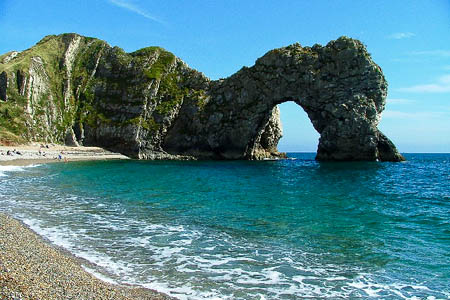
The first section of the England Coast Path also includes prime climbing sites such as Durdle Door. Photo: Gwyn Jones CC-BY-SA-2.0
The first few miles of the long-awaited path around the whole of England’s coast officially opened today.
Natural England announced 32km (20 miles) of the route around Weymouth Bay in Dorset is now in force and available for the public to use.
The scheme means part of England’s longest national trail, the South West Coast Path, has been moved closer to the sea, and avoids road sections that previously formed part of the route.
The Ramblers welcomed the establishment of the first stretch of the England Coast Path, which follows legislation passed by the last Labour government.
The charity’s president Kate Ashbrook said: “I’ll be visiting this stretch in a week’s time with the Dorset Ramblers as they celebrate the entire 17 miles with an inaugural walk, and I can’t wait to see what’s been accomplished.
“Although a lot of the stretch was already in existence, there have been some brilliant improvements to make it easier and more enjoyable for people walking in Weymouth.
“These include better views in several parts as the path winds closer to the sea than it did before, and room on either side of the path to relax and enjoy the surroundings of the Dorset coastline.
“The completion of this first stretch of the new coastal path is a great achievement, and shows just how wonderful it will be to have the route right round the English coast.”
Natural England, the Government’s advisory body on the outdoors, worked with Dorset County Council to introduce practical improvements to the path, which runs from Rufus Castle on Portland to Lulworth Cove. These included signs and gates, which were put in place where needed ahead of today’s commencement of the new access rights.
The Marine and Coastal Access Act provisions also allow for the rolling back of the path as cliffs erode or slip, solving longstanding difficulties with maintaining a continuous route around the slumping cliffs on this stretch of coast.
Jim Smyllie, Natural England’s executive director said: “These new public access rights are in place thanks to the close cooperation with, and the fantastic support of, Dorset County Council and the many landowners and local walkers involved.
“The path will provide permanent, secure and improved rights for walkers to enjoy some of the most dramatic coastline in England. We will start contacting landowners soon about the next stretch from Portland to Lyme Regis.”
Environment Minister Richard Benyon added: “Opening up miles of English coastline like this will allow thousands of people to better enjoy this spectacular natural environment and help support local economies by encouraging tourism.
“I want to see more people walking in and accessing our countryside as I know the value such activity has for our health, for our economy and for the spiritual uplift and wellbeing that comes from being out and about.
“This will be the first stretch of England’s coastline to be improved under the new coastal access provisions and it is now ready in time for the 2012 Games so people will have greater opportunities to enjoy the coastline and see the sailing.”
Ramblers will head to the coast around Weymouth for an inaugural walk on 6 July to be among the first to walk the first official stretch of the English Coast Path.
Ms Ashbrook said: “The South West Coast Path generates an estimated £307m a year for the local economy.
“Here at Weymouth it has been moved nearer to the sea to incorporate the new coastal path. We hope this new stretch will bring even more benefits to Weymouth and we look forward to seeing the same improvements all the way round our coastline to help revive our struggling coastal towns.
“I encourage anyone with a love for walking to get out there and enjoy exploring the new and improved access to the Weymouth coast.”
In March last year, Country Land & Business Association president William Worsley said: “The CLA was fundamentally opposed to the last government’s proposals for coastal access in England. We believe they were wholly unnecessary, and that it’s wasteful and absurd that the coalition is implementing its predecessors’ crazy plans at a cost of £50m.”
